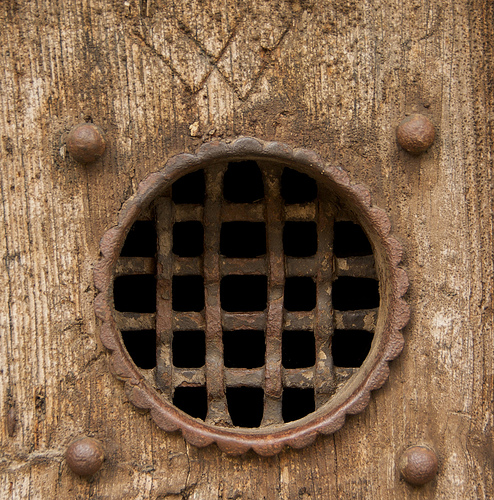FWP:
SETS == A,B; INEXPRESSIBILITY; STRESS-SHIFTING
GAZE: {10,12}
SWORD: {1,3}
The first line sets up a wonderful range of negative possibilities centering on the 'inexpressibility trope'. Here are some of the ways, with different emphases, that it can be read:
=Don't ask the lover's breast (because it's way too deeply
wounded and can't talk).
=Don't ask the lover's breast (because it can't find words for anything so
inexpressible).
=Don't ask the lover's breast (ask the door's wounded breast instead).
=Don't ask the lover's breast about the 'water' of the sword of the
gaze (because not water but 'air, wind' emerges from the wound that this
sword makes).
=Don't ask the lover's breast about the sword of the gaze (because
you can see that even the crevice-work on the door has received a deadly wound
from that sword).
Moreover, this is an 'A,B' verse-- how exactly are we to put the two lines together? Do they both describe the same situation in different words? Do they describe two different but similar situations? Do they describe two different, non-comparable situations? Here are some of the obvious possible readings:
=There was no crevice-work in the door until the beloved's
glance created it and made it sigh with passion; not to speak of the lover's
heart, even wood responds to her power.
=The crevice-work in the door has been wounded by the sword of the glance
that passed through it, and now sighs with passion; not to speak of the lover's
heart, even wood responds to her power.
=The crevice-work in the door of the lover's heart has been pierced through
by the sword of her glance; now wind/desire flows steadily out it.
=The lover's heart has been fatally wounded by the sword of her glance; the
proof is that even the crevice-work of the door has similarly succumbed to
her power.
Usually rauzan refers to the crevice-work high up in a brick wall, made for ventilation; for discussion and examples of this use, see {64,4}. In the present verse it seems to refer to something like a grill-worked peep-hole in a door.
The commentators seem to take it as a medical truism that when a wound begins to 'breathe' [saa;Ns denaa], then it's probably mortal.
The rich wordplay involved in aab is
one we've often encountered before; see {193,2}
for discussion. In addition, the double meaning of havaa
as both 'air, wind' and 'desire' works to excellent effect here. And the yoking
together of aab and havaa evokes aab-o-havaa
, 'water and air', which means something like 'climate'-- here, it's the 'climate'
of passion itself.

Nazm:
That is, through whichever door she gazes, don't consider it crevice-work-- but rather, that she has wounded it with the sword of her glance, and the wound too is so deep that the wind emerges through it. Then what is the condition of the lover's breast? The wound through which wind would emerge, and which would begin to 'breathe', is certainly deadly. (255)
== Nazm page 255